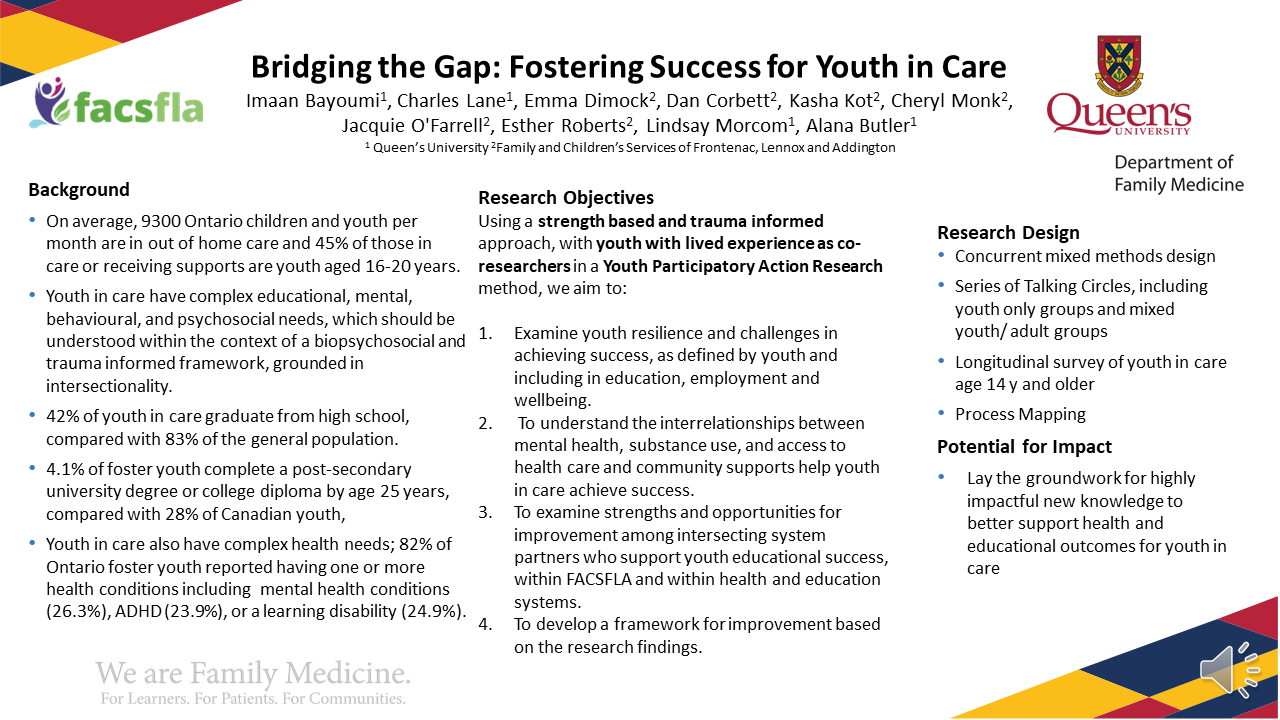PRP014: Bridging the Gap: Fostering Success for Youth in Care
Imaan Bayoumi, MD, MSc; Jacquie O'Farrell; Dan Corbett; Kasha Kot; Esther Roberts; Charles Lane; Emma Dimock, MA, BSW; Lindsay Morcom, PhD
Abstract
Context: Children’s Aid Societies work to protect children from physical, sexual and emotional abuse and neglect. On average, 9300 Ontario children and youth per month are in out of home care and 45% of those served are youth aged 16-20 years. Youth in care have complex educational, mental, behavioural, and psychosocial needs, which should be understood within the context of a biopsychosocial and trauma informed framework, grounded in intersectionality. Although 84% of youth in care report they want to do well in school, outcomes fall short of these aspirations, with 42% of youth in care graduating from high school, compared with 83% of the general population. In addition, COVID-19 related disruptions have been associated with learning loss, increased anxiety and educational and health inequities for youth. Objective: To examine youth resilience and challenges in achieving success, as defined by youth and including in education, employment and wellbeing. To understand the interrelationships between mental health, substance use, access to health care and community supports that help youth in care achieve success. Study Design: Concurrent mixed methods using Youth Participatory Action Research (YPAR). YPAR principles emphasize equitable practices that promote partnership and co-development of all aspects of research. Setting: Family and Children’s Services of Frontenac, Lennox and Addington (FACSFLA), child welfare agency in the Kingston, Ontario region. Population studied: A study cohort of youth age 14 years and older currently or formerly in FACSFLA care, foster parents, tutors and staff. Outcome measures: Quantitative measures assessing educational needs and supports, educational progress, mental and physical health, access to primary and specialist health care, access to cultural and social supports and sociodemographic characteristics. Qualitative data will be collected using a series of talking circles, an Indigenous culturally-appropriate data collection methodology, which will include foster youth, tutors, foster parents, tutors, and child welfare staff. Results: Quantitative measures will be described using descriptive statistics. Qualitative data will examine youth experiences of education, mental health, experiences of health services and educational services, as well as youth perspectives on success. Conclusions: Youth codesign will ensure relevance and be foundational for strategies to improve health and educational outcomes for youth in care.

Eva Purkey
11/20/2021thank you Imaan, this is such exciting work! I am sure you have thought of it, but I wonder if P2E is a partner on this project? I really look forward to hearing particularly what the youth have to say